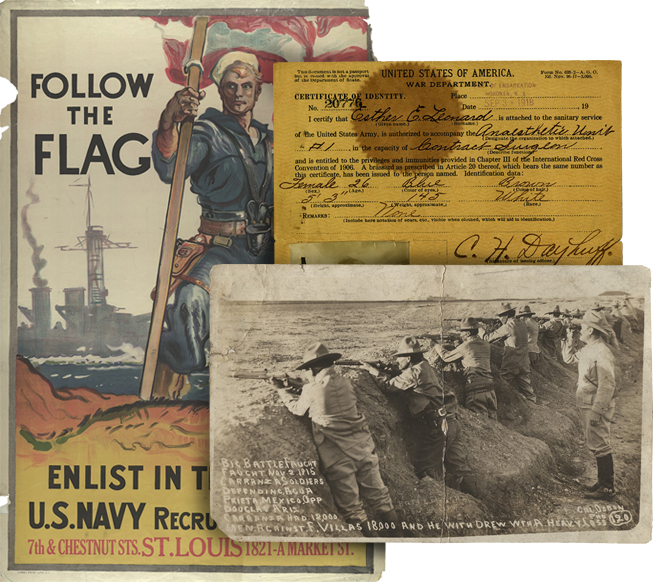Letter to Robert Lansing, Secretary of State

Transcript
War Department, Washington, May 31, 1917. My dear Mr. Secretary: In your communication of the 24th instant you call attention to Sections 2 and 5 of the Act of May 18, 1917, authorizing the President to increase temporarily the military establishment of the United States, and you ask the opinion of this Department as to whether

Transcript
[Page 2] are liable to service and they are subject to registration. The methods of registering and of drafting persons of military age and liable to military service are left to the discretion of the President, but the persons themselves within the prescribed age and liable are to be registered and drafted unless exempted by the Act, and the Act does not exempt declarants. Indeed, it specifically includes them, and by making an exemption of alien enemies in the very clause in which declarants are mentioned as liable, it is apparent that the question of the exemption of declarants was not overlooked. The Congress might have classed declarants with aliens who are, under the Act, no liable to military service, but the Congress did not do this. It is true that the United States has concluded treaties with various countries providing that the declaration of an intention to become a citizen of one or the other country has not for either party the effect of naturalization. These countries are the following: Austria-Hungary, September 20, 1870, Art. 1. Baden, July 19 1868, Art. 1. Ecuador, May 6, 1872, Art. 5. Haiti, March 22, 1902, Art. 5. Hesse, [August] 1, 1868, Art. 1. Mexico, July 10, 1868, Art. 1. North German Union, [February] 22, 1868, Art. 1. Peru, [October] 15, 1907, Art. 5. Salvador, March 14, 1908, Art. 5. Sweden and Norway, May 26, 1869, Art. 1. W

Transcript
[Page 3] treaties, because, if a mere declaration does not confer naturalization, the declarant is and remains an alien until he becomes a citizen by a subsequent act through taking out his second papers. If he is an alien, it is difficult to see how he can be made to serve in the military forces of the United States, as mere residence does not require more than temporary allegiance, whereas military service requires permanent allegiance, and the alien, owing to a temporary allegiance, may at his pleasure leave the country in which he happens to reside, which he can not do if he is incorporated in the military forces of the United States. But the Act of Congress, as the latest expression of the legislative will, abrogates the provisions of treaties opposed to or inconsistent with the Act (Whitney vs. Robinson, 124 U.S. 190), although the Act of Congress only repeals the national, leaving untouched the international obligation (Taylor vs. Morton, 2 Curtis 454, 459), and the foreign nation party to the treaty may seek to enforce this obligation either through diplomatic channels or by the resort to physical force if it should so determine. For it is a familiar doctrine, as laid down by Chief Justice Marshall, that

Transcript
[Page 4] tion determined by the Department of State, the War Department is prepared to recommend that, if a declarant pleads alienage and claims exemption from the draft or discharge from the army if drafted, his case be referred to the Department of State in order that the Secretary of State may consider the question and advice the President to release the declarant, if in his opinion the declarant should be released. Such action would be in accordance with the rules and regulations prescribed and followed in the Civil War, as appears from the following extracts of circulars of the Provost Marshal General

Transcript
[Page 5] enemies in the regulations prescribing registration and draft of persons liable to military service. But if the Department of State should be of the opinion that a declarant is an alien without a treaty provision to that effect, or that the Act of Congress should be so construed as to exclude from the draft declarants of countries with which the United States has treaties of the kind specified, the War Department is prepared to conduct its actions in accordance with the decision of the Department of State. I have to honor to be, Sir, You obedient servant, The Honorable Robert Lansing, Secretary of State. JBS/DeL
Details
| Title | Letter to Robert Lansing, Secretary of State |
| Creator | Unknown |
| Source | Unknown. Letter to Robert Lansing, Secretary of State. 31 May 1917. Crowder, Enoch H. (1859-1932), Papers, 1884-1942. C1046. The State Historical Society of Missouri, Columbia, MO. |
| Description | In this letter to the Secretary of State, Robert Lansing, from a member of the War Department, the author addressed the service of foreign aliens in the United States military. This document is part of a collection compiled by Enoch Herbert Crowder, the Edinburg, Grundy County, Missouri native who served as Judge Advocate General. Crowder devised the Selective Service Act in 1917 which drafted America's forces during World War I. |
| Subject LCSH | Crowder, E. H. (Enoch Herbert), 1859-1932; United States. Army--Recruiting, enlistment, etc.-- World War, 1914-1918; Draft; United States. War Department; Lansing, Robert, 1864-1928. |
| Subject Local | WWI; World War I; Selective Service Act of 1917; United States. Army. Foreign aliens |
| Site Accession Number | C1046 |
| Contributing Institution | The State Historical Society of Missouri |
| Copy Request | Transmission or reproduction of items on these pages beyond that allowed by fair use requires the written permission of the State Historical Society of Missouri: 1020 Lowry Street, Columbia, Missouri, 65201-7298. (573) 882-7083. |
| Rights | The text and images contained in this collection are intended for research and educational use only. Duplication of any of these images for commercial use without express written consent is expressly prohibited. |
| Date Original | May 31, 1917 |
| Language | English |



